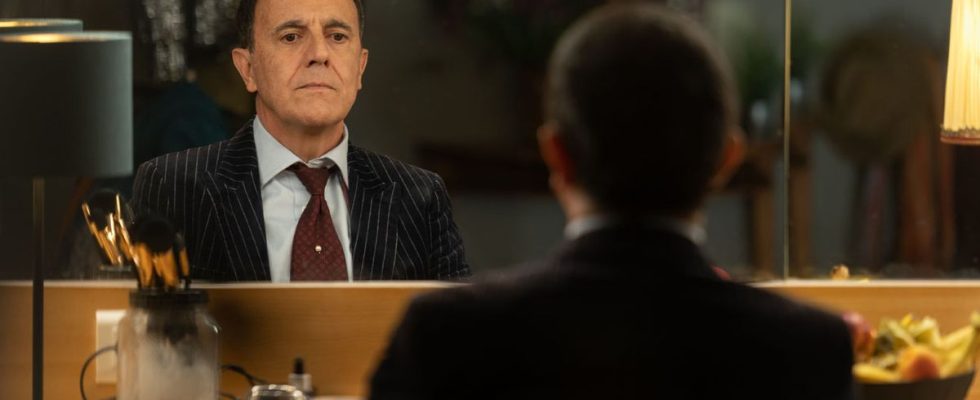France 2 is presenting a moving TV film this Wednesday evening. At 9:10 p.m., the channel broadcasts JI was born at 17inspired by the eponymous book by Thierry Beccaro published in 2018. The former host of Motus And Telematin There he confided that he had been the victim of violence for many years during childhood and adolescence, mistreated and beaten by his father.
A testimony transposed to the small screen which mixes autobiography and fiction, in which the actor plays himself as an adult. A role which was far from being obvious for this very discreet man. “It seemed like a joke because I was braking so hard,” he remembers. There was a first meeting with producer Raphaël Cohen. I told him that I could see so-and-so…”
When he received the script, Thierry Beccaro took a week to respond. “I couldn’t open it, I was nervous. I ended up reading it then I found the director Julien Séri to give him my comments. I start playing what I experienced… And at the end, he says to me: “It’s for you, it’s your story”.” Thierry Beccaro then accepts the role of this film which he now sees as a “rebirth” and once again confronts this painful past.
“I would have liked so much that one day, just once, he would ask me for forgiveness”
“Paradoxically”, the actor keeps in mind a “joyous” shoot. “I had a lot of fun and at the same time it was very serious. I felt that everyone who was involved in the adventure was concerned by the theme,” he remarks. He also takes the time to tell his story to the actors who play the different people in his family: Manon Lheureux and Elisabeth Comelin who play the role of his mother in two distinct eras, Moïse Santamaria that of the violent father or even Elsa Lunghini, Laurence in the film, the host’s companion.
He talks particularly with the two young actors who play him, Pierre Azarello, the 7-year-old Thierry and Jules Morlon, the 17-year-old. “He had read the book and he was also very concerned, even if he did not didn’t know what I went through. We spent a little time together,” he recalls.
For his part, Thierry Beccaro explains that he “had no trouble playing” his own role. “It wasn’t for me that it was difficult,” he notes, “but rather for the technicians, the script, the teams…” He remembers a scene that shook up the set. The one where he goes to his father on his deathbed to speak to him one last time, years after having cut ties with him. A sequence of pure fiction. “I had to tell him, because I didn’t have this chance” in real life, he explains. He adds, with emotion: “That’s almost the summary of what I would have liked to say to him. I would have liked so much that one day, just once, he would ask me for forgiveness. That way, we would have gone a little way together.”
“We don’t arrive on this planet to experience this scene”
In this film, Thierry Beccaro explains having said “more things [qu’il] never told those close to him. But it doesn’t show everything. “It’s a quarter of what I experienced. There were things that were impossible for children to play. I wouldn’t have wanted it,” he says. The whole challenge was therefore to transcribe the mistreatment implicitly. The beatings, the psychological violence, but also the loneliness, suffering and terror. “Can you imagine what a lifetime of wondering daily is like what your dad will be like, what your mom will be like? You have no childhood, no adolescence. I lived day to day for years,” recalls the actor.
A scene in the film of incredible violence is particularly difficult to watch. Thierry Beccaro is 17 years old. One evening from his bedroom in the family apartment, he heard screams coming from the kitchen. He gets up and discovers his father, who is pointing a gun at his terrified mother. The teenager will subsequently plunge into a state of astonishment. A trauma rooted in him decades later. “We can’t move. We don’t arrive on this planet to experience this scene,” he says.
Sequences with a psychologist also punctuate the story of this film and are inspired by the therapy that Thierry Beccaro followed for many years. A work that allowed him to move forward and helped him tell his story. “You have to be totally free from pain and impossibilities to be able to shoot this film. Otherwise, I collapse every time,” he confides.
I was born at 17 is also a story of resilience and “rebirth”, underlines the host. It is also a message of hope addressed “to all those who have passed or are passing through this”. “What I do through the film is show people that we can do it, that we can get through it, that there is sun above the clouds. It’s complicated, it takes courage and you absolutely have to do the work that I did on the couch,” says Thierry Beccaro.

